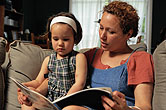- Double Mastectomy May Offer No Survival Benefit to Women With Breast Cancer
- Toxic Lead Found in Cinnamon Product, FDA Says
- Certain Abbott Blood Sugar Monitors May Give Incorrect Readings
- Athletes Can Expect High Ozone, Pollen Counts for Paris Olympics
- Fake Oxycontin Pills Widespread and Potentially Deadly: Report
- Shingles Vaccine Could Lower Dementia Risk
- Your Odds for Accidental Gun Death Rise Greatly in Certain States
- Kids From Poorer Families Less Likely to Survive Cancer
- Tough Workouts Won’t Trigger Cardiac Arrest in Folks With Long QT Syndrome
- At-Home Colon Cancer Test Can Save Lives
Pediatrics Group Wants Parents to Read to Their Children Every Day


All pediatricians should encourage parents to read out loud to their children every day, beginning in infancy, to promote literacy and strengthen family ties.
That clarion call comes in a new policy statement issued Tuesday by the American Academy of Pediatrics’ Council on Early Childhood.
The aim of the recommendation is to help parents “immunize their children against illiteracy,” said statement author Dr. Pamela High, director of developmental and behavioral pediatrics at Hasbro Children’s Hospital in Providence, R.I., and a professor at Brown University.
In fact, literacy promotion should be part of residency training for any medical student entering pediatrics, the policy statement added.
“This is the first time the AAP has called out literacy promotion as being an essential component of primary care pediatric practice,” High said. “Fewer than half of children are being read to every day by their families, and that number hasn’t really changed since 2003. It’s a public health message to parents of all income groups, that this early shared reading is both fun and rewarding.”
The stakes are high. Every year, more than one of every three American children start kindergarten without the language skills they need to learn to read, a disadvantage from which it is hard to recover, High noted.
Reading proficiency by the third grade turns out to be the most important predictor of whether children will graduate high school and be successful in their careers, she said. About two-thirds of children in the United States and about 80 percent of those below the poverty threshold fail to develop reading proficiency by the end of the third grade.
The policy statement asks pediatricians to counsel parents about “developmentally appropriate reading activities that are enjoyable for the child and the parents and offer language-rich exposure to books and pictures and the written word.”
The statement will be published in the August print issue of Pediatrics.
Research has found that children who are read to by their parents have a leg up when it comes to literacy, High said. Reading can provide even infants with spoken words and sounds that form the basis of future language and literacy development.
Children whose parents don’t read to them “hear fewer words and know fewer words. They have fewer literacy resources in the home,” she said. “In children with stronger reading abilities, you will learn that their parents started reading to them at a younger age.”
Parents reading to their young children also creates a nurturing experience that promotes social and emotional development during a critical period of early development, the statement reads.
“It really is evidence-based that we’re going to have several benefits of daily reading from infancy on. It stimulates brain development, and there’s no question their speech/language development will be enhanced,” said Dr. Peter Richel, chief of pediatrics at Northern Westchester Hospital in Mount Kisco, N.Y. “It also enriches the family experience, and contributes to social/emotional development.”
Richel said that his hospital already has taken steps to make literacy promotion part of the education that new pediatricians receive.
“We’re adding this in terms of their training, to counsel parents during well-child visits to include daily reading,” he said.
Poverty makes a difference in parents’ reading to kids, and the policy statement encourages state and federal funding for children’s books to be provided to parents at or near the poverty line.
About 34 percent of children age 5 and younger in families living below the poverty line are read to daily, compared to 60 percent of kids in families living 400 percent or more above the poverty line, High said.
Parents should keep reading to their children for as long as their kids show an interest, she said.
“My personal choice about that was I kept reading to my kids until they were 10 or 11,” High said, noting that as kids grow older parents can help improve reading comprehension by having deeper discussions about each book.
Richel agreed, but added that parents should make sure they don’t force reading upon an uninterested teen.
“When they are reading, some kids want to have every book in the world, while others want to pick up every piece of athletic equipment they see and aren’t really in love with reading,” he said. “I would make that [reading] part of the routine as long as it lasts. When there’s the eye roll, you don’t want to be counterproductive, so you never force.”
More information
For more on reading to your child, visit Reading Is Fundamental.
Source: HealthDay
Copyright © 2024 HealthDay. All rights reserved.










